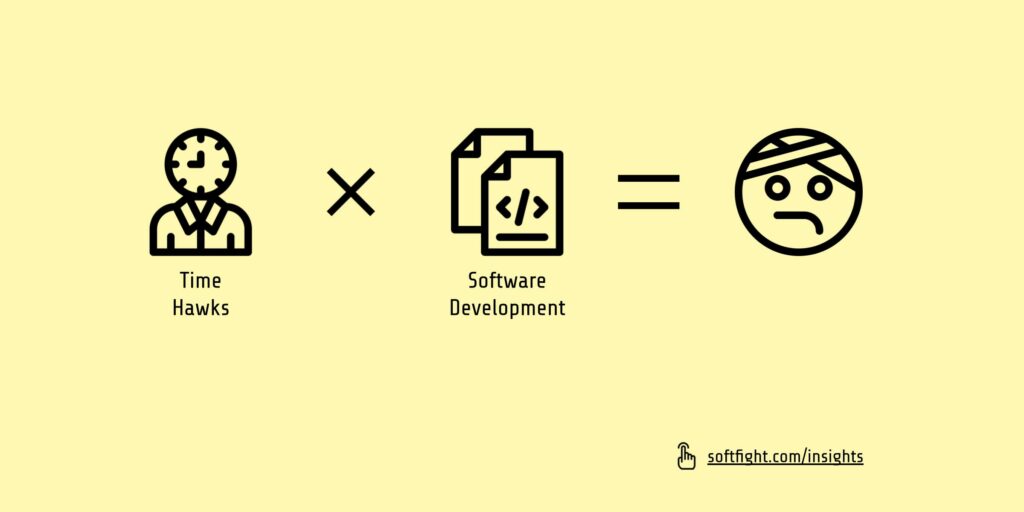It looks as though hourly billing is the most natural thing in the world. A client needs work done. Your employees deliver the work. You pay them a monthly salary. So you divide the salary by the number of hours worked, you add the overhead costs plus a healthy margin and that’s your price.
Simple. Efficient. Straightforward.
Maybe even “fair”?

Why is hourly billing so widely used?
Because it’s easy to communicate.
Because this is “how we always did it”.
Because this is “how everyone in our industry charges for their services”.
Because clients want to have a quick and easy way to compare suppliers. That is why this is the most common question a prospective client will ask in the first conversation with a potential vendor: what is your hourly rate? I need to have an idea about your prices before I can tell you any details about our project.
Why is it harmful?
Charging by the hour is a mechanism that punishes efficiency, expertise and skill.
Let’s compare 2 software developers, both paid 60 EUR per hour.
Developer A can finish project M in 240 hours. The client pays 240*60= 14.400 EUR.
Developer B would finish the same project in 140 hours, at a similar level of quality, because he is more experienced, more proficient with the technology used, is more disciplined with his coding practices and in the ways he manages his mental energy. The client would pay 140*60= 8.400 EUR.
The client would receive from Developer B the same quality, in a shorter time and would pay almost half the price.
The more skilled, more efficient developer would get paid a lot less.
The problem is that, over a period of one year, working a similar number of hours in total, for multiple clients, the two developers would make the same amount of money.
Is there any incentive for Developer A to improve his skills, to deliver higher quality? No, not at all. As long as he can charge this rate and clients pay him, there is no need to do anything differently.
But when you are paid for deliverables or outcomes, your best interest is to develop and use methods, tools, ways to do things better, faster. The client gets better value, the vendor also wins.
If we compare Value Created with Value Captured by each of the two developers, we see there is a huge imbalance between them. Charging the same hourly rate would bring them the same value over one year. But Developer B would have created significantly more value in this time, because he delivered more projects for more clients.
Why is this system toxic for everyone involved
> It creates an environment where everybody is watching the clock rather than focus on the work itself and the quality of the work.
- The employee will not have any incentive to do things better or faster. And they will learn that it’s better for them to overestimate the effort needed.
- The vendor will be careful to quantify, report and charge all the time spent on the project.
- And the clients will constantly worry that they are being overcharged and paying for time that wasn’t really spent working for them.
> It places the transaction risk on the clients. So the clients will expect to pay less, because they are taking on risk and need to be compensated for it.
> It means that it’s almost impossible to know the price of the project upfront. A fundamental law of economics and buying psychology says that customers compare value to price to decide what they buy. With hourly billing, they only know the price (= total budget spent) at the end.
> It leads to short-term thinking in everything, from financial forecasting, to team performance management, quality management and business planning. And short-term thinking only works on, well, the short-run. Sometimes not even then.
I am sure you can come up with many other reasons from your own experience.
What are the alternatives?
- Weekly rates
- Sprint-based pricing
- Monthly retainer
- Fixed-scope, fixed-budget projects.
- Charging per activity, per unit of work or per outcomes.
- Pain share, gain share agreements.
Anything else is better when we talk about software development services.
None of these options are ideal for all situations.
Depending on the context, the objectives or the constraints, the optimum solution can look differently.
But they are all better than hourly billing or daily rates.
Are there any situations when hourly billing is recommended, from a vendor’s perspective?
Yes.
For experts bringing their expertise as individual contributors in projects where they have little control over timeline and deliverables, IF they can justify premium rates.
And for beginner freelancers and small companies who don’t know what they are doing. When you are new in an industry, you have limited skills, cannot accurately estimate how long it will take to finish something, you are very likely to produce sub-par work that will need re-work and re-writes. By all means, charge by the hour if you are in this situation, otherwise it will be very difficult to reach year 2 or 3 and still be in business.
WHAT THIS MEANS FOR YOU
Stop using hourly billing and daily rates?

